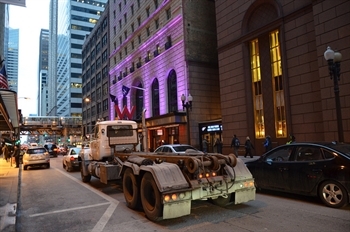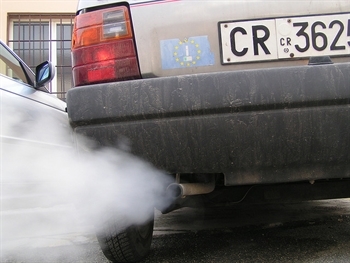
Photo courtesy of Flickr user add1sun.
Cars parked at the Houston Airport.
See all the articles in the Solving the Parking Predicament series. >>
MPC Research Assistant Lena Ferguson authored this post.
Think it’s hard to find a parking spot? Think again. In the U.S., more than 800 million parking spaces exist to serve 250 million registered motor vehicles – at least a three-to-one ratio! If every car or truck in America is parked in an existing spot, at least 550 million spaces remain empty at any given moment.
Think of all that asphalt. Parking is the single biggest urban land use, and therefore accelerates urban sprawl. The total amount of land devoted to parking is about the size of Connecticut. In fact, many parking facilities are designed so that spaces are full only 10 hours per year, resulting in parking lots bigger than the places they are designed to serve, higher development costs, and unattractive land use.

Half-empy parking lot.
Photo courtesy of Flickr user jgrimm.
These lots often aren’t designed that way merely by choice, but because zoning ordinances require it. Many places in the U.S. have high minimum parking requirements and no maximum parking requirements, meaning there’s no cap on the amount of parking developers are allowed to build. While the minimum parking requirements in downtown Chicago are better than average and parking maximums do exist, the Chicago zoning ordinance still requires new residential buildings in the Loop to have .55 parking spaces per unit with a maximum of 1.1 to 1.5 spaces per unit. What’s more, developers can apply for permits to build parking exceeding the maximum. This can result in a disparity between how much parking is built and is actually needed. For example, while developers usually project that 55 percent of renters will lease parking spaces, in Chicago’s Lakeshore East development, that’s currently down to 40 percent. If the parking minimum requirement was the maximum, it would better reflect the demand for parking in this case.

Rush-hour traffic in the Loop.
Photo courtesy of Flickr user Michael Kappel.
Though 99 percent of all vehicle trips end in free parking, it has expensive hidden costs: Estimated construction costs in 2012, per space, were $4,000 to $8,000 for a surface lot, $12,000 to $24,000 for a stand-alone garage, $40,000 to $70,000 for an automated garage, and $40,000 to $100,000 for an underground garage. So, while drivers often do not have to feed a meter or pay an hourly fee, we all absorb the cost of parking through higher retail and housing prices, reduced wages and benefits, and higher taxes. Donald Shoup, professor at the University of California Los Angeles and perhaps the world’s foremost expert on parking, estimates the total subsidy for off-street parking in the U.S. in 2002 was as much as $374 billion. To put that figure in perspective, that’s just over three-quarters what the federal government spends on Medicare.

Car exhaust.
Photo courtesy of Flickr user Simone Rapella.
Somewhat counter-intuitively, parking also perpetuates traffic congestion and environmental degradation. On average, 30 percent of cars in traffic are actually cruising for on-street parking. As those vehicles circle … and circle … and circle the street, they burn fuel and emit exhaust, polluting the air.
Fortunately, cities can take steps to better manage parking and even reimagine their parking spaces’ potential. MPC’s Solving the Parking Predicament series will highlight parking management theories, and ways in which cities across the country are using demand pricing, zoning requirements, and a little rethinking to better manage land dedicated to parking.